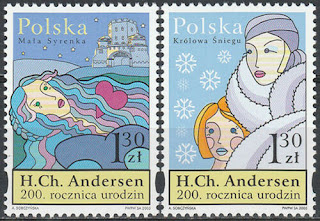Here are some events that happened on April 2nd. It could be an event or a person that died or was born on that day
1805 Born: Hans Christian Andersen, Danish novelist, short story writer, and poet (d. 1875)
Hans Christian Andersen (2 April 1805 – 4 August 1875), in Denmark usually called H.C. Andersen, was a Danish author. Although a prolific writer of plays, travelogues, novels, and poems, he is best remembered for his fairy tales. Andersen's popularity is not limited to children; his stories express themes that transcend age and nationality.
Andersen's fairy tales, consisting of 3381 works and translated into more than 125 languages, have become culturally embedded in the West's collective consciousness, readily accessible to children, but presenting lessons of virtue and resilience in the face of adversity for mature readers as well. His most famous fairy tales include "The Emperor's New Clothes," "The Little Mermaid," "The Nightingale," "The Steadfast Tin Soldier", "The Red Shoes", "The Princess and the Pea," "The Snow Queen," "The Ugly Duckling," "The Little Match Girl," and "Thumbelina." His stories have inspired ballets, plays, and animated and live-action films. One of Copenhagen's widest and busiest boulevards, skirting Copenhagen City Hall Square at the corner of which Andersen's larger-than-life bronze statue sits, is named "H.C. Andersens Boulevard."
Stamps from Denmark, Poland and Germany depicting Hans Christian Andersen or his works
1840 Born: Émile Zola, French novelist, playwright, journalist (d. 1902)
Émile Édouard Charles Antoine Zola (2 April 1840 – 29 September 1902) was a French novelist, playwright, journalist, the best-known practitioner of the literary school of naturalism, and an important contributor to the development of theatrical naturalism. He was a major figure in the political liberalization of France and in the exoneration of the falsely accused and convicted army officer Alfred Dreyfus, which is encapsulated in the renowned newspaper headline J'Accuse…! Zola was nominated for the first and second Nobel Prize in Literature in 1901 and 1902
More than half of Zola's novels were part of a set of 20 collectively known as Les Rougon-Macquart, about a family under the Second Empire. Unlike Balzac, who in the midst of his literary career resynthesized his work into La Comédie Humaine, Zola from the start, at the age of 28, had thought of the complete layout of the series. Set in France's Second Empire, in the context of Baron Haussman's changing Paris, the series traces the "environmental" influences of violence, alcohol, and prostitution which became more prevalent during the second wave of the Industrial Revolution. The series examines two branches of a family—the respectable (that is, legitimate) Rougons and the disreputable (illegitimate) Macquarts—for five generations.
As he described his plans for the series, "I want to portray, at the outset of a century of liberty and truth, a family that cannot restrain itself in its rush to possess all the good things that progress is making available and is derailed by its own momentum, the fatal convulsions that accompany the birth of a new world."
He is considered to be a significant influence on those writers that are credited with the creation of the so-called new journalism; Wolfe, Capote, Thompson, Mailer, Didion, Talese and others. Tom Wolfe wrote that his goal in writing fiction was to document contemporary society in the tradition of John Steinbeck, Charles Dickens, and Émile Zola.
1891 Born: Max Ernst, German painter, sculptor, and poet (d. 1976)
Max Ernst (2 April 1891 – 1 April 1976) was a German (naturalized American in 1948 and French in 1958) painter, sculptor, graphic artist, and poet. A prolific artist, Ernst was a primary pioneer of the Dada movement and surrealism. He had no formal artistic training, but his experimental attitude toward the making of art resulted in his invention of frottage—a technique that uses pencil rubbings of objects as a source of images—and grattage, an analogous technique in which paint is scraped across canvas to reveal the imprints of the objects placed beneath. He is also noted for his novels consisting of collages.
Some stamps from various countries depicting Max Ernst's paintings











No comments:
Post a Comment